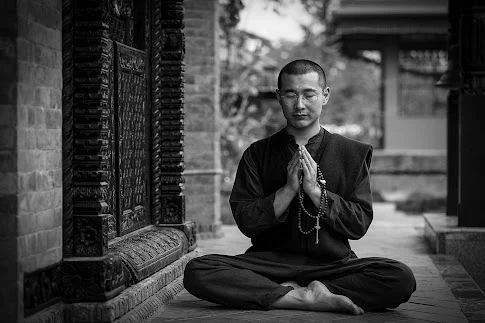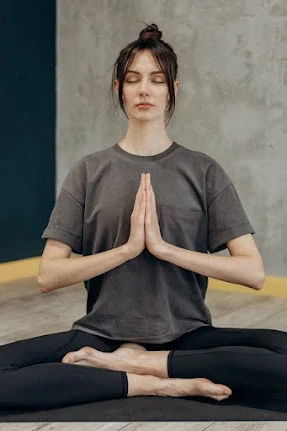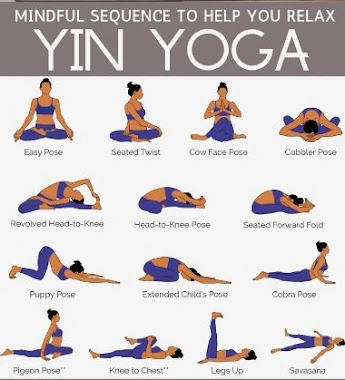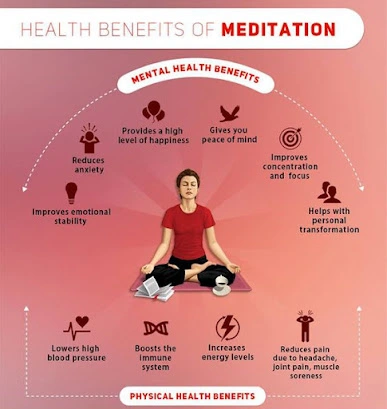MINDFULNESS AND MEDITATION
MINDFULNESS AND MEDITATION
The Benefits of Meditation for Stress Management

Numerous advantages of meditation include reduced stress, boosted immunity, and delayed mental aging. People from many areas of life find that this age-old technique is one of the most effective ways to reduce stress. There are numerous ways to meditate and integrate it with different spiritual practices. Additionally, it has numerous significant applications.
It can be a part of your daily routine and help you build resilience to stress.
It can be a technique to get centered when you're thrown off by emotional stress.
It can be a quick-fix stress reliever to help you reverse your body's stress response and physically relax.
By developing mental and physical calmness, you can eliminate your emotional and physical tension. You feel better, more rested, and prepared to take on the problems of the day with a positive outlook after doing this. You might reap even bigger rewards if you practice consistently over several weeks or months.
What is Meditation?
Several methods are used in meditation to assist individuals in focusing their attention and reaching a higher level of awareness. It has been demonstrated to have several health advantages and the ability to induce alterations in consciousness.
Sitting comfortably and emptying your mind is the practice of meditation. Alternatively, you can concentrate on a single thought and purge it of all others. A sound, such as "ooommm," your breathing, counting, a mantra, or nothing at all can be your point of concentration.
A common thread among the many meditation techniques is that the mind stops following every new thought that comes to the surface.
It’s generally necessary to have at least five to 20 distraction-free minutes to spend, though meditation sessions can really be any length. Longer meditation sessions tend to bring greater benefits, but it is usually best to start slowly so you can maintain the practice long-term.
It can become scary or daunting for many people to try to meditate for an extended period of time each session, or to establish a "perfect" practice, which makes it harder for them to stick with as a daily habit. It is far preferable to establish the habit and include it into a more complete form of that habit.
It’s helpful to have silence and privacy, but more experienced meditators can practice meditation anywhere.
Although many meditation practitioners associate meditation with spirituality, it can also be used as a secular practice. There really isn't a bad approach to practice meditation.
Meditation and Stress
The power of meditation to lower stress is one of its primary advantages. The stress response sets off an instinctive series of reactions in your body that prime you for either running or fighting. This bodily reaction is beneficial in certain situations involving great danger. But sustained periods of this kind of anxiety can harm every area of the body physically.

By inducing the body's relaxation reaction, meditation has the exact opposite effect on the body as stress. By bringing the body back to a state of calm, it aids in self-healing and guards against further harm from the physical side effects of stress.
Recap
One way that meditation can benefit your mind and body by quieting the stress-induced thoughts that keep your body's stress response triggered.
The Role of Relaxation
Since meditation also involves a more direct form of physical relaxation, these two forms of relaxation can be quite beneficial in reducing stress. Regular practice of meditation can lead to long-term resilience, which is a bigger benefit.
Research has shown that those who practice meditation regularly begin to experience changes in their response to stress that allow them to recover from stressful situations more easily and experience less stress from the challenges they face in their everyday lives.
Research suggests that people who regularly experience pleasant moods are more resilient to stress, thus part of this may be due to the boost in positive mood that meditation can bring. According to other research, regular meditation practitioners' brain alterations are associated with a reduced response to stress.

Refocusing your thoughts is a skill that you may exercise to help you break negative thought patterns and, in and of itself, reduce stress. With only one easy practice, meditation provides multiple answers.
Health Benefits of Meditation
One of the many ways that meditation helps you is by reversing your stress reaction, which protects you against the negative effects of ongoing stress.
When practicing meditation:
You use oxygen more efficiently.
Your adrenal glands produce less cortisol.
Your blood pressure normalizes.
Your heart rate and breathing slow down.
Your immune function improves.
Your mind ages at a slower rate.
Your mind clears and your creativity increases.
You sweat less.
Regular meditators find it simpler to break harmful behaviors like drinking, smoking, and using drugs. Additionally, they discover that it is simpler to prevent day-ending rumination.

Many find it helpful in connecting to a source of inner strength. Several studies have shown that meditation reduces stress and increases resilience in a variety of populations. Though it is still in its infancy, meditation research shows promise.
The Pros And Cons of Meditation
There are many benefits to meditation, both mentally and physically:
It might be simpler for those with physical limitations to practice than to engage in physically demanding activity as a stress reliever. Furthermore, no specialized equipment is needed.
In contrast to seeking professional assistance, meditation is a free practice.
There aren't many possible negative effects of meditation, in contrast to some drugs and herbal remedies.
You can practice meditation anywhere, at any time, and it's always available.
It is incredibly beneficial for both long-term health and short-term stress relief. You can experience the benefits of meditation after just one session.
While meditating is a great tool for many people, there are a few things to be aware of before beginning the practice:
Making meditation a regular practice does need commitment and discipline. Compared to techniques that seek external assistance or encouragement, some people find it more difficult to stick with as a habit. If this describes you, joining a meditation group might be the ideal answer.
It could be more difficult for certain people to break free from the daily thoughts. This might make it more challenging than techniques like journaling, which entail focusing on these occurrences, or distracting techniques like humor or physical activity.
Some people may not be able to meditate comfortably while seated due to physical or mental health issues. Try a moving meditation instead, like yoga or running.
Some studies suggest that meditation can be harmful to those who have experienced trauma or other serious mental health conditions.8 In such cases, other mind-body practices such as somatic body-based therapy may be a good alternative.
An experienced instructor is not always required, but they might be useful. In the end, you can meditate now if you can keep your attention on your breath, the here and now, or any one object for a prolonged period of time.
Still, it usually takes some getting used to, and some people struggle to "get it" at first. Additionally, meditation demands some patience, and it could be challenging for those with little free time (such as some mothers who remain at home and have little solitude from young children). But when you consider the advantages, learning and practicing are well worth the time and effort.
Considerations
Keep these four things in mind when you begin your mediation practice.
Consistency Is Key
Long-term practice is not as important as consistent practice. This indicates that five minutes, six times a week, is preferable to thirty minutes, one time a week, for meditation. While the latter may relax your body more deeply but can only reverse your stress response once, the former can quiet your body's stress response multiple times per week.
Furthermore, if you can begin with brief daily sessions, you are more likely to maintain a regular meditation practice than if you feel that you must make time for lengthier sessions. It's more likely that this pressure you put on yourself will cause you to lose interest in trying and find it difficult to find time for.
Research suggests that the amount of time it takes to make a behavior a habit can vary from as little as 18 days to as long as 254 days.
Practice Doesn't Mean Perfect
"Perfect" practice is not as important as regular practice. This means that you should just sit and meditate rather than worrying too much about how to sit, what posture to adopt, how long to sit, or what time of day to do it.
If you just get started, the rest will fall into place; but, if you feel that you must sort out these issues beforehand, it can be more difficult for you to get started. In any case, there's no "wrong" way to meditate—any meditation is better than none at all.
It's Alright if Your Thoughts Wander
If you catch yourself daydreaming, that's a positive sign. Some people find meditation difficult, especially perfectionists. Sometimes we get caught up in the trap of wanting to do things "right" and getting angry with ourselves when we can't think clearly. It's important to keep in mind that if you become aware of something occurring, it's a positive sign.
The true purpose of meditation is to notice and bring your thoughts back to the object of your attention, which can be your breath, the current moment, or anything else you choose. Anyhow, it's nearly hard to keep your mind from straying.
Keeping your focus on the present moment is not an easy task—even long-time meditation practitioners find it challenging. Don't feel discouraged by this.
Getting Started
These wonderful advantages of meditation are available in a variety of formats. Concentrative meditation, which centers attention on a single place, and mindfulness meditation, which emphasizes developing awareness and acceptance of the present moment, are the two main categories of meditation.
Try a few different ones; you might find that some are more comfortable for you to practice than others. Then, you can repeat the strategies that work best for you. You will find it simpler to employ meditation as a calming approach when you need it if you practice it outside of stressful situations.
Start at a Calm Time
It is a good idea to practice meditation first when you aren't feeling overly stressed, even if you only intend to use it occasionally and not as a daily exercise. That is, of course, unless you are unable to find a time when you don't feel this way.
The most important thing to remember is to practice meditation for a few minutes per day and to try to sit for at least five minutes each session.
Pay Attention to Your Breath
You can just concentrate on paying attention to your breathing for five minutes if you don't know where to begin. Sit comfortably, release tension from your body, and pay attention to your breathing. Just return your focus to your breathing whenever you notice that you are thinking about something else.
Counting breaths is another easy tactic. Think of the number "one" as you inhale and the number "two" as you exhale. If you find yourself becoming sidetracked by other thoughts, just resume at "one" and keep breathing.
Some people will find counting easier to practice than simple breathing meditation, and others will find it more challenging. Remember, your best meditation techniques are the ones that resonate with you.
Make Use of Guided Meditation
One type of meditation that entails having a guide lead you through the process is called guided meditation. This manual frequently uses mantras, breathing exercises, mental images, and other strategies to help the practitioner focus.
Guided meditations can be found on a wide range of platforms, such as podcasts, websites, apps, online movies, and streaming services. Group meditation classes are another service that yoga studios may provide.
FREQUENTLY ASKED QUESTIONS
When should I meditate?
Meditation can be done at any time of day, but it is often easiest to find the time in the morning or evening. If you are new to meditation, it may be helpful to set aside a specific time each day for your practice. Once you have established a regular practice, you may find that you can meditate anywhere, anytime.
Can meditation help me sleep?
Yes, meditation can be very helpful for getting a good night’s sleep. If you have trouble falling asleep, or if you wake up during the night and can’t get back to sleep, try meditating for 20 minutes before going to bed. You may find that your mind is calm and clear, and that you are able to fall asleep more easily.
Can you meditate lying down?
Yes, you can meditate lying down. What matters more than the meditation posture is if you can hold that posture comfortably for a period of time. Lying down is one option, but you can also try sitting in a chair if it is more comfortable.
How long should you meditate for?
There is no hard and fast rule for how long you should meditate. If you are just starting out, you may want to start with 5-10 minutes per day. Once you have established a regular practice, you can increase the time to 20 minutes or more per day.
Like this project
Posted Mar 7, 2024
Numerous advantages of meditation include reduced stress, boosted immunity, and delayed mental aging. People from many areas of life find that this age-old tech
Likes
0
Views
1






